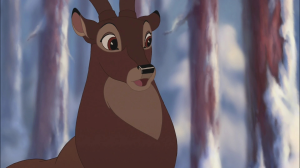By 2007, DreamWorks Animation was a cultural force that had successfully carved out its own territory in an industry long dominated by Pixar. Its brand of irreverent humor, sharp pop culture satire, and surprising heart was cemented by the revolutionary success of Shrek in 2001, a film that not only won the first Academy Award for Best Animated Feature but also rewrote the rules for family entertainment. In the years that followed, the studio proved its formula was no fluke, building a portfolio of globally recognized properties. From the record-shattering success of Shrek 2 to the globe-trotting adventures of the Madagascar crew, DreamWorks had become a reliable engine for generating blockbuster hits.
Videos by ComicBook.com
With such a consistent track record, the industry and audiences alike had come to expect a certain kind of massive success from the studio, which is precisely what made the release of Bee Movie on November 2, 2007, so perplexing. Conceived as a passion project for comedy legend Jerry Seinfeld, the film’s deeply unconventional premise proved surprisingly divisive, ultimately preventing it from becoming the colossal hit it was positioned to be.
Bee Movie‘s initial reception was decidedly mixed. Critics were lukewarm, often dismissing the film for its strange plot, which followed a bee named Barry B. Benson (voiced by Seinfeld) who decides to sue the human race for stealing honey. Many reviews also criticized the film’s reliance on puns and a central romance between a bee and a human woman, Vanessa Bloome (voiced by Renée Zellweger), that many found unsettling. Despite the tepid reviews, the film managed to haul in over $293 million worldwide. However, this respectable figure paled in comparison to the box office heights of other DreamWorks properties, especially compared to the massive $150 million budget of Bee Movie. Fortunately, the passage of time has been extraordinarily kind to Bee Movie, which has undergone a remarkable transformation from a theatrical oddity to a celebrated cult classic.
Bee Movie‘s Surge in Popularity Is Well Deserved

The second life of Bee Movie began nearly a decade after its release, fueled entirely by the unpredictable engine of internet culture. Around the mid-2010s, a generation that had grown up watching the film began to re-examine its bizarre premise and quirky humor through the lens of online memes. What started on platforms like Tumblr with sincere posts appreciating the movie’s opening monologue quickly morphed into an explosion of absurdist humor. For instance, video remixes, such as “Bee movie trailer but every time they say bee it gets faster,” went viral, accumulating millions of views and cementing the film’s status as a cornerstone of meme culture.
Even more surprisingly, this online resurgence led to a genuine critical re-evaluation of the film. The constant meme-ification encouraged audiences to revisit the movie, where many discovered a surprisingly sharp and satirical comedy that had been overlooked in its initial run. Furthermore, the very elements that critics had dismissed as weaknesses, such as the surreal plot and the deadpan delivery of Seinfeld, became celebrated as hallmarks of an ambitious animated feature.

This widespread affection is entirely deserved because Bee Movie is a genuinely entertaining film. The movie functions as a clever satire of modern society, tackling themes of conformity, corporate exploitation, and the often-unquestioned routines of adult life. Above everything else, Barry’s disillusionment with the predetermined path of working in a hive until death is a relatable commentary on the anxieties of entering the workforce, which has only become more relevant as the economy becomes more unstable each year. Finally, the sheer audacity of its plot, a courtroom drama centered on interspecies justice, remains one of the most wonderfully strange concepts ever committed to a mainstream animated film.
What are your thoughts on Bee Movie and its surprising legacy? Leave a comment below and join the conversation now in the ComicBook Forum!









